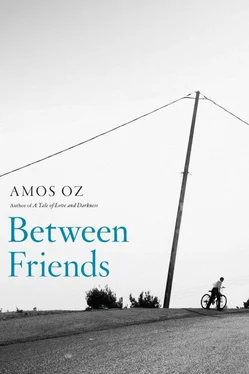Moshe, wearing his dusty work clothes and shoes that stank of chicken droppings, crossed the road lined with cypress trees, passed two abandoned sheds and a tin-roofed lean-to, and reached the large chicken coop. Even from a distance, the smell of the coop enveloped him: the stench of chicken excrement, of the dust that rises from the feed, of torn-out feathers that stuck to the wire netting, along with another vague smell of overcrowding and suffocation. Cheska Honig was waiting for him, sitting on a small stool sorting eggs into cartons according to size. Moshe asked her how she was, then told her that today, right after work, he was taking the four o’clock bus to visit his father. Cheska pointed out that when she was young, she just got up one day and ran away from home to go to Eretz Israel and join a kibbutz, so she actually never said goodbye to her parents. The Nazis murdered them in Lithuania. “Where is this family of yours, anyway?” Cheska asked Moshe. “They live in some kind of immigrants’ camp?”
In a low, even voice Moshe told her what he told everyone here who asked him, that his mother died and his father fell ill and his uncle fell ill, too, so he and his brothers and sisters were sent to live in various kibbutzim. As they spoke, he rolled the feed cart under the large funnel of the feed container and filled it to the brim. He pushed it along the concrete walk between the two rows of cages and began to fill the troughs with feed. Under the cages crammed with chickens were piles of droppings. When here and there he found a dead chicken in a cage, he opened the cage, took out the carcass, and placed it gently on the concrete walk behind him. When he finished distributing the feed into all the troughs, he went back to collect the carcasses. Low moaning filled the air as if the hens, squeezed together two by two in the cages, were keening a faint, persistent, lost lament. Only now and then did a sharp screech of fear burst from one of the cages, as if a chicken had suddenly guessed how all of this would end. After all, no two chickens are or ever have been exactly alike. They all look the same to us, but they are actually different from one another the same way that people are, and since the creation of the world, no two identical creatures have ever been born. Moshe had already decided to become a vegetarian one day, maybe even a vegan, but had postponed implementing the decision because being a vegan among the kibbutz boys would not be easy. Even without being a vegetarian, he had to work hard day and night to seem like everyone else here. He had to keep his feelings to himself. Pretend. He thought of the cruelty of eating meat and of the fate of these hens, doomed to spend their entire lives packed tightly in wire cages, unable to move even one step. Someday, Moshe thought, a future generation will call us murderers, unable to comprehend how we could eat the flesh of creatures like ourselves, rob them of the feel of the earth and the smell of the grass, hatch them in automatic incubators, raise them in crowded cages, force-feed them, steal all their eggs before they hatch, and finally, slit their throats, pluck their feathers, tear them limb from limb, gorge ourselves on them, and drool and lick the fat from our lips. For months now, Moshe had been plotting to open a cage and surreptitiously steal a chicken, only one, hide it under his shirt, away from the watchful eyes of Cheska and Shraga, spirit it out of the coop, and set it free on the other side of the kibbutz fence. But what would an abandoned chicken do all alone in the fields? At night the jackals would come and tear it to pieces.
He was suddenly disgusted with himself, a feeling he had often and for many and sundry reasons. Then he was disgusted by his disgust, scornfully calling himself a bleeding heart, a label that David Dagan sometimes applied to those who recoiled from the necessary cruelty of the revolution. Moshe respected David Dagan, a man of principle with strong opinions who spread a fatherly wing over him and all the other students in their school. It was David Dagan who had welcomed him into Kibbutz Yekhat and guided him gently but firmly into his new life. He was the one who signed Moshe up for the art club and the current events group, and he it was who defended him fiercely against the other children’s mocking attitude when he first arrived. Moshe knew, as we all did, that David was living with a very young girl, Edna Asherov, Nahum the electrician’s daughter. There had been many women in David’s life, and though that surprised Moshe, he said to himself that after all, David Dagan wasn’t an ordinary person like the rest of us, but a philosopher. He didn’t judge David because he didn’t like to judge other people and because he was so grateful to him. But he did wonder. He had often tried to put himself in David Dagan’s shoes, but he was never able to imagine the teacher’s easy sense of entitlement when it came to women and girls. Not just social revolution, he thought, not even the final, cruel one that David spoke about, could lead to equality between people like David, who attracted women effortlessly, and people like me, who would never dare, not even in their imaginations.
Yes, Moshe Yashar did occasionally dream of his classmate Carmela Nevo’s shy smile and of her fingers playing melancholy songs on the recorder, but he never dared to approach her, not with words, and almost never with looks. From where he sat in class, two rows behind her, he could see the curve of her slender neck as she bent over her notebook and the soft down of the hair on her nape. Once, when Carmela was standing between the light and the wall talking to one of the girls, he walked past and stroked her shadow. Afterward, he lay awake half the night, unable to sleep.
Cheska said, “After you’ve set the thermostat in the brooder house and checked that there’s water in the trough and fed the chicks and put all the egg cartons in the refrigerator, you can go. I’ll write down the daily summary for you today. And I’ll let you go fifteen minutes early so you have time to shower and change and catch the four o’clock bus.”
Moshe, who was collecting the dead chickens he had left on the walkway to drop them outside in the barrel to be burned, said, “Thank you.” And added, “I’ll be back tomorrow morning and I’ll come to work fifteen minutes early in the afternoon.”
Cheska said, “The main thing is that you show them you are a total kibbutznik now.”
Alone in the shower, he scrubbed off the smells of the coop with soap and water, dried himself, and put on long, ironed trousers and a white Sabbath shirt, rolling the sleeves up past his elbows. He went to his room, took the bag he had packed during the ten o’clock break, and left quickly, cutting across the lawn and past the flower beds. Zvi Provizor, the gardener, was kneeling at one of them, pulling up weeds. He looked up and asked Moshe where he was off to. Moshe was going to say that he was on his way to visit his father in the hospital but, instead, he said only, “Town.”
Zvi Provizor asked, “Why? What do they have there that we don’t have here?”
Moshe said nothing, but thought about replying: Strangers.
At the central bus station, when he got off the Kibbutz Yekhat bus and boarded the one to the hospital, Moshe chose to sit in the last row of seats. He took his threadbare black beret out of his bag and put it on his head, pulling it down so that it hid half his forehead. He buttoned his shirt all the way up and rolled his sleeves all the way down to his wrists. And instantly looked as he had on the day the welfare worker brought him to Kibbutz Yekhat. He was still wearing the summer sandals they’d given him on the kibbutz, but he was almost sure his father wouldn’t notice them. There were very few things his father still noticed. The bus wove through the alleyways near the central bus station, and the smell of heavily fried food and combusted gasoline drifted in through the open windows. Moshe thought about the girls in his class who had begun to call him Moshik. Now that the teasing and mocking had passed, Moshe found that he was enjoying kibbutz social life. He liked school, where he could sit in class barefoot on summer days and argue freely with his teachers without having to show any of the usual subservience. He liked the basketball court. He also liked the art club and the current events group meetings in the evenings where they discussed adult matters, and Israeli life was usually represented by two camps: the progressive and the old-world. Moshe was well aware that part of him still belonged to the old world because he didn’t always accept progressive ideas, but rather than argue, he simply listened. He spent his free time reading the books by Dostoevsky, Camus, and Kafka that he borrowed from the library, finding himself deeply touched by the enigmas contained in their pages. He was drawn more to unsolved questions than to glib solutions. But he told himself that perhaps this was still part of the adjustment process and in a few months, he’d learn to see the world the way David Dagan and the other teachers wanted their students to see it. How good it was to be one of them. Moshe envied the boys who rested their heads so easily on the girls’ laps as they lay on the big lawn in the evening and sang work songs and patriotic tunes. Until the age of twelve, so he was told, girls and boys had showered naked together. Chills of excitement and fear had run down his back when he heard that. Day after day, Tamir and Dror and the other boys had seen Carmela Nevo naked, and they grew inured to what they saw, while for him, even the thought of the curve of her neck and the soft down on the nape made him tremble with longing and shame. Would he become one of them someday? He yearned for that day, but was afraid of it too, and he also knew in his heart of hearts that it would never come.
Читать дальше












